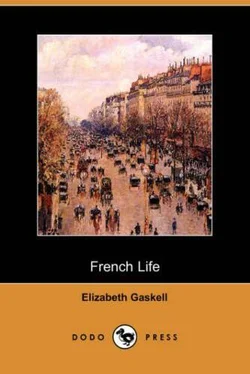Madame, too, has been out to market; half across Paris, it may be, in her old black gown, to some shop she knows of, where she fancies such and such an article can be had better or cheaper. She has gone by the omnibus, taking advantage of the correspondance , by which, on payment of thirty centimes, and declaring her wish for a correspondance ticket to the conducteur of that which passes her door, she is conveyed in it to the general omnibus office, close to the Place des Victoires, where she may have to wait for a few minutes for an omnibus going in the direction for which her correspondance ticket is taken. If she has to return by any of the midway stations at which omnibuses stop, she has to purchase a ticket with a number upon it at the bureau , and await her turn, at busy times of the day — say at five o'clock, at the Place Palais-Royal. Her number may be eighty-seven, while the next Grenelle omnibus is filling with twenty-three, twenty-four, twenty-five, and so on, as the conducteur calls the numbers. But in the morning they are not so crowded; and Madame is always at home, and dressed with delicate neatness, by eleven o'clock, the time of our "second déjeûner ," or what we should call lunch in England. This breakfast consists generally of cold meat, a rechauffé of some entrée or dressed vegetables of the day before, an omelette, bread, wine, and a pot of confitures . For us our kind hostess has tea; but I can see that this is not their ordinary custom. It is curious to see how little butter is eaten in a French family; they, however, make up for this by the much greater use of it in cookery; for vegetables form, a dish by themselves, always requiring either gravy, butter, or oil, in their preparation. After lunch is over, we all sit down to work; perhaps Nanette practises a little, and perhaps some of us go out for a walk, but always with some object, either of pleasure or business. A Frenchwoman never takes a walk in the English constitutional sense. There are books about in the salon , but not so many as in England. They have nothing equivalent to «Mudie» in Paris, and the books of their circulating libraries are of so very mixed a character, that no careful mother likes to have them lying about on the table, Indeed, "novels and romances" are under much the same ban as they were under in England seventy or eighty years ago. There is the last Revue des Deux Mondes , and a pamphlet or two besides, lying by Madame's work-basket, and there are the standard French authors in the bookcase in the cupboard. Yet, somehow, my friends always know what is going on in the literary world of Paris. The newspapers here are so doctored that they are deprived of much of the interest which usually attaches to political news; but I generally see La Presse lying about.
Once a week, Madame "receives." Then the covers are taken off the furniture in the salon ; a fresh nosegay is put in the vase; Madame and Mademoiselle and Nanette put off their final dressing for the day till after the second breakfast, and then appear in the gowns they wear on jours de fêtes . Monsieur keeps out of the way, but nevertheless is much disappointed if, when we all meet together at dinner, we have not accumulated a little stock of news and gossip to amuse him with. Madame's day of reception is well known to all her friends and acquaintances, who make a point of calling on her two or three times a season. But sometimes no one comes at all on the Thursdays, and it is rather flat to sit from two to five or thereabouts in our company dresses, with our company faces, all for no use. Then again, on other Thursdays, the room is quite full, and I sit and admire Madame's tact. A new arrival comes up to her, and, without appearing to displace any one, the last comer invariably finds an empty chair by the lady of the house. The hostess also accompanies every departing guest to the room-door, and they part with pretty speeches of affection and good-will, sincere enough, I do not doubt, but expressive of just those feelings which the English usually keep in the background.
On Thursdays we have generally much the same sort of dinner that in England we associate with the idea of washing-days; for both Julie and Gabrielle have been busy admitting or letting out visitors; or at any rate Madame anticipated this probability when she ordered dinner.
The dinner-hour is six o'clock; real, sharp six. And here I may warn my English friends of the necessity of punctuality to the hour specified in a French dinner invitation. In England, a quarter of an hour beyond the time is considered as nothing, and half an hour's grace is generally acceded. But it is not so in France; and it is considered very ill-bred to be behind the time. And this remark applies not merely to the middle-class life I have been describing, but to the highest circles. Indeed, the French have an idea that punctuality is a virtue unknown among the English; and numerous were the stories of annoyance from English unpunctuality which the French officers brought home from the Crimea. But, to return to our day at Madame — 's. We do not dress for dinner, as we should do in England; that ceremony, as they consider it — refreshment, as we should call it — is reserved for the days when we go into society, and then it takes place after dinner.
We have soup-always good. On Fridays we have fish; not from any religious feeling, but because that is the day when the best fish is brought into Paris, and it is not very fresh even then. Then we have a made-dish, or two or three times a week the bouilli from which the stock for the soup is made-a tender, substantial, little hunch of boiled beef of no known joint. Then come the vegetables, cooked with thick rich gravy, which raises them to the rank they hold in a French dinner, instead of being merely an accessory to the meat, as they are in England. The rôti and the salad follow. The mixing of the salad is too important an operation to be trusted to a servant. As we are here, Madame does not like to leave her visitors; but I see Gabrielle peep from behind the portiéres , and make a sign to Mademoiselle about five minutes before dinner; and Mademoiselle goes into the salle-à-manger , and Madame rather loses the thread of her discourse, and looks wistfully after her daughter; for, if Monsieur is particular about anything, it is about his salads. Strictly speaking, Madame tells me, the vegetables ought to be gathered while the soup is on the table, washed and cleansed while we are eating the bouilli , and sliced and dressed with the proper accompaniments while the rôti is being brought in. Madame's mother always mixed it at the table, she says, and I have no doubt Madame follows the hereditary precedent herself, when she has no foreign visitors staying with her. After this, a chocolate custard, or a sweet omelette, a purée of apples, perhaps; and then dessert is put on the table — a bit of gruyére cheese under a glass, and the " Quatre Mendiants ," i.e. , nuts, almonds, raisins, figs, called after the four begging Orders of friars, because these fruits are so cheap that any beggar can have them.
We have a little cup of black coffee all round, when we return to the salon ; and, if we were not here, our friends would have nothing more that night; but out of compliment to us there is tea at nine o'clock, that is to say, there is hot water with a spoonful of tea soaked in it. They look upon this mixture in much the same light as we consider sal volatile — not quite as a dram, but as something that ought to be used medicinally, and not as a beverage.
March 10 th . - Madame and I have had a long talk about prices, expenditure, &c. As far as I can make out, provisions are to the full as dear as in London; house-rent is dearer, servants' wages are much the same. She pays her cook and housemaid four hundred and fifty and four hundred francs respectively. But the household work is differently arranged to what it is in England. The cook takes the entire charge of a certain portion of the apartment, bedrooms included; the housemaid attends to the rest, waits at table, helps one of the daughters of the house to get up the fine linen, and renders them any little services they may require in dressing. The cook is enabled to take part of the household-work, because it is the custom in Paris to prepare provisions in the shops where they are sold, so that the cook can buy a sweetbread, or small joint, or poultry, ready-larded, the spinach ready-boiled and pulped for a purée , vegetables all cut into shapes for her soup, and so on. The milk, which I had remarked upon as so remarkably good, is, it appears, subjected to the supervision of inspectors armed with lactomètres , delicately-weighted glass-tubes marked with degrees: this ought to sink up to a particular number in good unadulterated milk, and all that is brought into Paris is tested in this and other ways at the various barrières . It is very difficult, however, to obtain milk in the afternoons or evenings, even at the crêmeries , without ordering it beforehand. The Government regulates the price of bread, which is lower in Paris than in the neighbouring towns; the legal tariff is exposed in every baker's shop, and false weights and measures are severely punished.
Читать дальше












